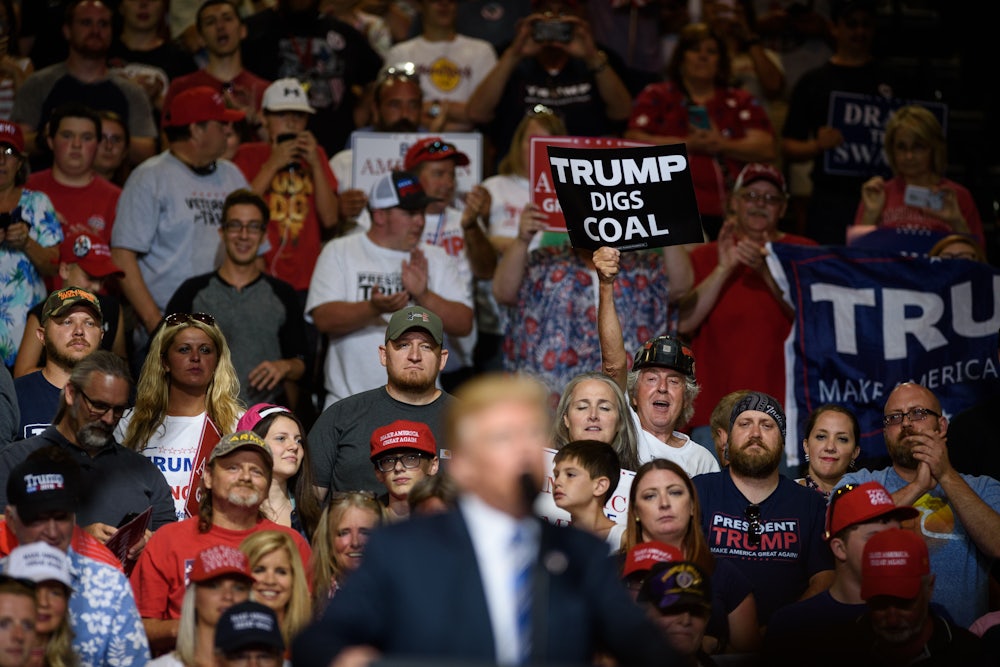Around two dozen coal miners sat at fold-out tables outside the West Virginia capitol building on Tuesday, eating barbecue. Dressed in full work gear, including hardhats, they sweated under an unseasonably warm sun as they devoured pulled pork, cabbage, and red-skinned potatoes. The feast was prepared for them by Rupie Phillips, a Democrat-turned-independent state delegate running as a Republican for Congress. As he shook the miners’ hands, he passed out stickers containing the same phrase emblazoned on his black baseball cap: “I survived the war on coal.”
He and everyone else at this party seemed to believe it.
“I think we ought to forever celebrate today,” Chris Hamilton, senior vice president of the West Virginia Coal Association, told the crowd, which also included the state attorney general and lieutenant governor. “Today signifies officially the end of the war on coal. I think we should always celebrate November 28.”
Tuesday was the day the Environmental Protection Agency came to West Virginia. The agency’s industry-friendly administrator, Scott Pruitt, had agreed to hold exactly one public hearing on his plan to repeal the Clean Power Plan—President Barack Obama’s signature climate change regulation—and he wanted to do it in coal country. Earlier that morning, coal executives, lobbyists, and top state Republicans told EPA officials that the CPP would destroy the coal industry—and that repealing it would bring coal jobs back. “We have always known coal has been the backbone of the economy of the state. And it always will be,” Tim Armstead, the speaker of the West Virginia House of Delegates, told the coal miners. “Those who say it will not simply are not grasping reality.”
This narrative appears to be taking hold among West Virginians. “It definitely looks good for coal, looks good for my future,” David Murray, one of the miners at Tuesday’s barbecue told me. “I got a degree in mining engineering, so I’m happy to be working for coal, and I feel pretty confident about the future.”
There’s good reason to believe the Trump administration will follow through with its plan to repeal the CPP, which would require the American power sector to reduce its greenhouse gas emissions by 32 percent from 2005 levels by the year 2030. (The plan was stayed by the Supreme Court in 2016.) The EPA’s two-day public hearing was a farce. The agency split Tuesday’s hearing into three rooms far apart from each other on sprawling state capitol complex, and assigned all the major anti-regulation speakers to one room. That was the room the miners attended—possibly at the request of their boss, Murray Energy CEO Robert Murray—and it was the only room that the EPA live-streamed online. Environmental advocates, representatives from local interest groups, and regular citizens who signed up to speak were assigned to the other rooms. The agency doesn’t have any more public hearings scheduled.
But the case that repealing the Clean Power Plan will save the coal industry is weak, and Republicans and the coal industry know it. While there has been an uptick in coal production since Trump took office, it is unlikely to last because the rise of cheaper natural gas—not environment regulations—is driving coal’s decline; even Trump’s Department of Energy has acknowledged as much. Though the CPP is not in effect, markets have already shifted to a cleaner energy economy; as Vox points out, technological advances have made natural gas and wind power “cheaper than coal power in most places, and solar power is heading the same direction.” And even Murray believes Trump should “temper his expectations” when it comes to saving coal jobs. “He can’t bring them back,” Murray said in March.
The relationship between West Virginia and coal is a paradox. In a state where nearly half of all children live in low-income households, coal provides some of the best working-class jobs around—dangerous and unhealthy jobs, yes, but also secure and high-paying. Yet the industry is also responsible for blowing off the tops of the state’s mountains and polluting the state’s water, making it undesirable for other businesses and thereby keeping many others jobless and poor. But this is only a paradox if one accepts that no other industry can replace coal in West Virginia—that the only way to save these communities is by saving coal, rather than creating a growth industry to replace it.
Those who make money and gain power from coal’s dominance know that no amount of deregulation can arrest coal’s inevitable decline. But when they’re face-to-face with West Virginians, like this week in Charleston, they elide that reality and claim that coal will never die, and indeed will grow. That’s what families that have depended on coal for generations want to hear. “I’m tired of being blamed for hurricanes,” said miner Rick Wilson, a barbed-wire tattoo encircling his left forearm. “I’m tired of being called a murderer.” No one should demonize the workers whose toil has powered America’s growth for so long, but they also need to hear the harsh truth from the people they trust most: Trump can’t bring coal back, and misery awaits those who cling to this myth.
Correction: A previous version of this story misattributed a quote to Jake Stump, a writer for WVU Magazine. Stump did not speak to The New Republic for this story.
